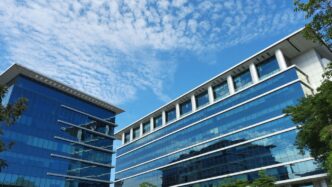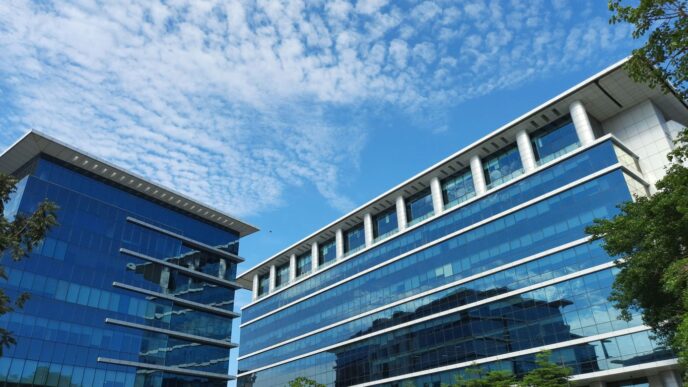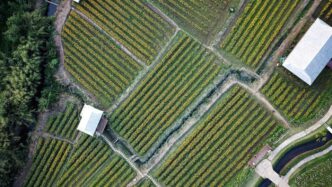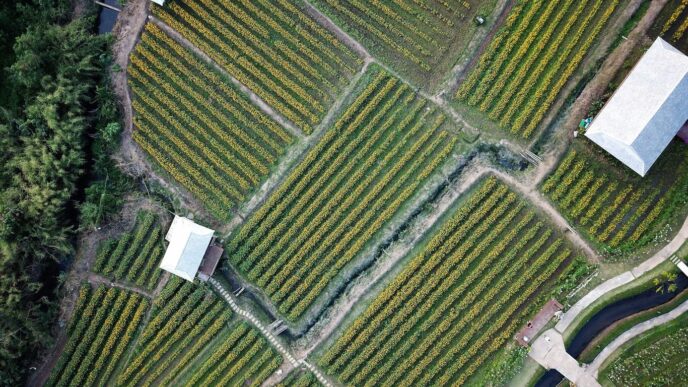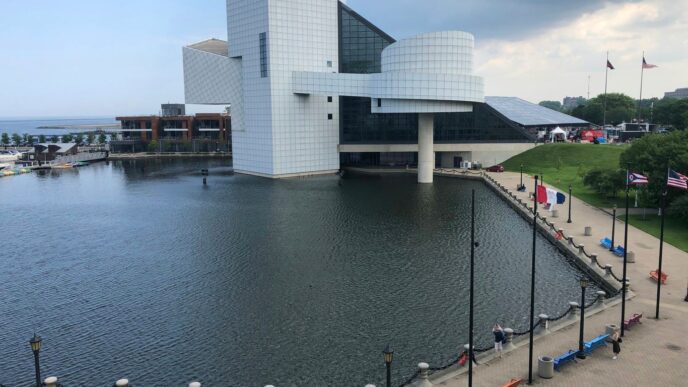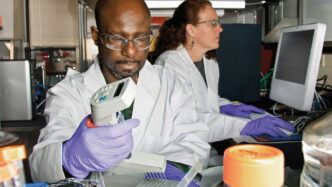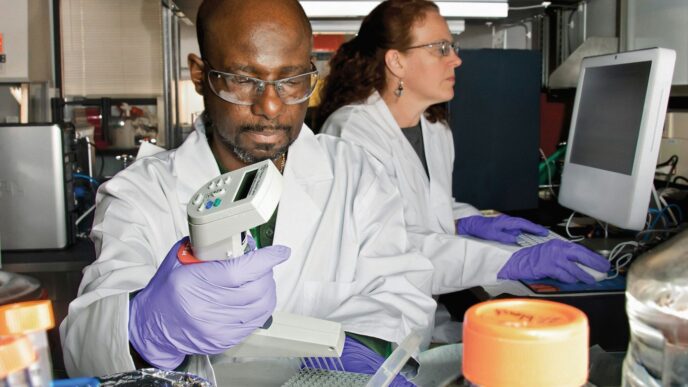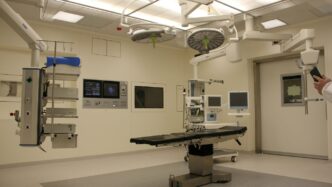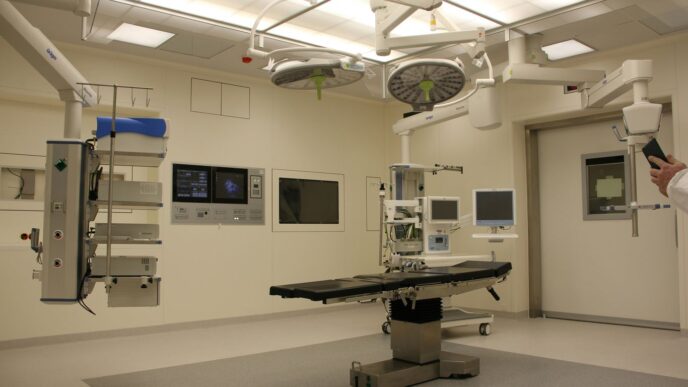Farming is changing, and fast. With more people to feed and a changing climate, farmers need new ways to grow food. Bayer-Agri is one company that’s putting a lot of effort into finding these new ways. They’re looking at everything from better seeds to using data to make farming smarter and kinder to the planet. It’s a big job, but it’s important for all of us.
Key Takeaways
- Bayer-Agri is investing heavily in new technologies to help farmers grow more food, even with challenges like climate change.
- Their work includes developing stronger seeds, smarter ways to protect crops, and using digital tools for better farm management.
- Data plays a big role, with platforms like Climate FieldView™ helping farmers make more informed decisions on their land.
- The company is also focused on making farming more sustainable, looking at things like soil health and reducing chemical use.
- Bayer-Agri aims to support farmers directly through education and making new tools more accessible.
Bayer Agroscience: Pioneering Agricultural Advancements
It feels like agriculture is changing faster than ever these days, right? Bayer Agroscience is right there in the middle of it, pushing things forward. They’re not just selling seeds and sprays; they’re really trying to build a whole new way of farming for the future. Think about it – we need to feed more people, deal with weird weather, and still be kind to the planet. That’s a tall order, but Bayer seems to be tackling it head-on with some pretty smart ideas.
Shaping Agriculture for 2025 and Beyond
Bayer’s vision for agriculture in the coming years is all about making farming smarter and more sustainable. They’re focusing on solutions that help farmers get more from their land without using more resources. It’s a big shift from how things used to be done, moving towards a more precise and data-driven approach. They’re looking at everything from the seeds farmers plant to how they protect their crops and manage their fields.
Addressing Global Food Security Challenges
With the world population growing, making sure everyone has enough to eat is a huge deal. Bayer is putting a lot of effort into developing crops that can handle tough conditions, like drought or new pests that pop up because of climate change. They’re also working on seeds that give better yields, which is pretty important when you’re trying to feed billions. It’s about making sure that even in challenging environments, farmers can still grow the food we all need.
Driving Innovation Through Research and Development
So, how are they doing all this? A big part of it is their commitment to research and development. They’re investing a lot of money and brainpower into finding new ways to improve crops. This includes using advanced genetics and even gene-editing tools to create plants that are tougher and more productive. They’re also looking at biological solutions for pest control and using digital tools to give farmers better information. It’s a multi-pronged approach to innovation, trying to cover all the bases to help agriculture move forward.
The Imperative for Agricultural Innovation
Meeting Growing Global Food Demand
The world population keeps growing, and by 2030, we’re looking at close to 8.5 billion people. That’s a lot of mouths to feed, and it puts a huge amount of pressure on farming to produce more food than ever before. We need to figure out how to grow enough to go around, and do it in a way that doesn’t wreck the planet.
Mitigating Climate Change Impacts on Crops
Farming is really feeling the heat from climate change. We’re seeing weird weather patterns, more droughts, and new pests and diseases popping up because of it. These changes make it harder for crops to grow well, and farmers are constantly having to adapt to unpredictable conditions. Innovation is key to developing crops that can handle these stresses and keep producing.
Overcoming Resource Scarcity in Farming
Water is getting scarcer in many places, and our soil isn’t always in the best shape. These are big problems for farming. If we don’t have enough water or good soil, it’s tough to grow crops. Finding ways to use water more wisely and improve soil health is a major challenge that innovation needs to tackle.
Achieving Environmental Sustainability Goals
There’s a big push for farming to be more environmentally friendly. People expect farmers to use fewer chemicals, protect nature, and even help the environment by storing carbon in the soil. This means finding new methods and technologies that allow us to grow food while also taking care of the earth. It’s a balancing act, but a really important one.
| Challenge Area | Current State |
|---|---|
| Global Food Demand (by 2030) | ~8.5 billion people |
| Climate Change Impact | Erratic weather, increased droughts, new pests |
| Water Availability | Decreasing in many agricultural regions |
| Soil Health | Degradation and reduced fertility in some areas |
| Environmental Expectations | Reduced chemical use, biodiversity protection |
Key Innovations Driving Bayer’s Agricultural Vision
Bayer Agroscience is really pushing the envelope when it comes to making farming better, not just for farmers, but for the planet too. They’ve got a few big things going on that are changing how we grow food.
Next-Generation Precision Crop Protection
Forget just spraying everything everywhere. Bayer is all about being smart with crop protection. They’re using digital tools to figure out exactly where and when a plant needs protection from pests or diseases. This means using less chemical product, which is good for the environment and saves farmers money. Think of it like targeted medicine for crops instead of a broad-spectrum approach. They’re using things like advanced sensors and weather data to make sure the right product gets to the right spot at the right time. This cuts down on waste and helps protect helpful insects and the soil.
Advanced Seed Genetics and Gene Editing
Seeds are the starting point for everything, right? Bayer is investing a lot in making seeds tougher and more productive. They’re using gene editing tools, kind of like a precise biological editor, to develop crops that can handle tough conditions like drought or heat. They’re also using advanced breeding techniques that speed up the process of selecting for good traits, like better yields or more nutrients. The goal is to have crops that need fewer resources and can still grow well, even when the weather is unpredictable. This is super important for making sure we have enough food, especially in places that get hit hard by climate changes.
Climate FieldView™: Data-Driven Farming
This is where the digital side of farming really comes in. Climate FieldView™ is a platform that pulls together a ton of information – from satellites, sensors in the field, and even the equipment itself. It then uses this data to give farmers real-time insights. You can see things like soil health, how much water is available, and even predict where pests might show up. This helps farmers make better decisions, like applying fertilizer or water only where it’s needed. It’s all about using data to be more efficient and productive.
Sustainable Biologicals and Integrated Pest Management
Bayer is also looking at natural solutions. They’re developing biological products, which are basically derived from natural materials, to help protect crops. This is part of a bigger strategy called Integrated Pest Management (IPM). IPM combines different methods – biological controls, resistant crop varieties, and targeted chemical use – to manage pests and diseases. The idea is to rely less on traditional chemicals and more on a mix of smart, sustainable approaches. This helps keep the ecosystem healthy and reduces the overall impact on the environment.
Digital Farming and Data Analytics with Bayer Agroscience
It’s pretty wild how much farming has changed, right? Back in the day, it was all about what your grandpa told you. Now, Bayer Agroscience is really pushing this whole digital farming thing, using data to make everything smarter. Think of it like this: instead of guessing, farmers get real-time info to make better choices.
Precision Input Management for Efficiency
This is where things get really interesting. Bayer’s Climate FieldView™ platform, for example, helps farmers figure out exactly what their crops need, when they need it. It’s not just about throwing fertilizer around; it’s about putting the right amount, in the right place, at the right time. This means less waste, which is good for the wallet and the planet. We’re talking about applying nutrients and crop protection products with a lot more accuracy. This approach can really cut down on environmental impact while still getting the best possible results from the fields.
Remote Crop Monitoring and Health Analysis
Remember when farmers had to walk every single row to check on their crops? Well, that’s changing. Bayer uses things like satellite images and sensors that can be placed in the fields. These tools keep an eye on how the crops are growing, how much water is in the soil, and if there are any early signs of pests or diseases. It’s like having a doctor for your entire farm, available 24/7. This early detection means farmers can act fast before a small problem becomes a big one.
Yield Analytics and Predictive Forecasting
Knowing what you’re likely to harvest is a big deal for planning. Bayer’s systems use smart computer programs to look at all the data collected and make educated guesses about how much the crops will yield. This helps farmers plan for harvest, storage, and even how they’ll sell their produce. It’s about taking the guesswork out of the equation and making the whole process more predictable.
Streamlining Compliance and Sustainability Reporting
Farming today comes with a lot of rules and paperwork, especially when it comes to being sustainable. Bayer’s digital tools can help with this too. They automatically collect and organize the data needed to show that a farm is meeting certain standards. This makes it easier for farmers to prove they’re doing things the right way, which is important for consumers and for meeting global goals. It’s about making sure the good practices are documented and recognized.
Commitment to Sustainability and Environmental Stewardship
Bayer Agroscience really gets that farming needs to work with nature, not against it. It’s not just about growing more food, but doing it in a way that keeps the planet healthy for the long haul. They’re putting a lot of effort into programs that help farmers improve their land.
Regenerative Agriculture Programs for Soil Health
Think of soil as the foundation of everything. Bayer is pushing for practices that actually rebuild soil health. This means things like planting cover crops between main harvests to keep the soil from washing away and reducing how much we till the land. They also support crop rotation and multi-cropping. The goal is to make the soil richer, hold more water, and store carbon. It’s a big shift, but it makes farms tougher against things like drought and helps them use fewer chemicals over time. They even have programs to help farmers make this transition, which can be a big change.
Reducing Chemical Usage and Environmental Footprint
Nobody wants chemicals everywhere, and Bayer is working on ways to cut down on their use. This includes developing better ways to apply pesticides, so they only go where needed. They’re also big on biological solutions – using natural things like beneficial microbes to protect crops instead of synthetic chemicals. Integrated Pest Management (IPM) is a key part of this, which means using a mix of strategies to control pests while keeping the environment in balance. It’s about finding smarter ways to protect crops that are easier on the planet. For instance, their precision crop protection solutions aim to reduce chemical use by about 35% and cut down on spray drift significantly.
Enhancing Biodiversity and Ecosystem Health
Farms are part of a bigger picture, and Bayer is looking at how to make farms better for wildlife and natural systems. This involves strategies like creating buffer zones around fields to protect natural habitats and encouraging practices that support pollinators. They’re also looking at how seed genetics can play a role, developing crops that might need less water or are more resistant to pests, which indirectly helps the environment. It’s about creating farms that are not just productive, but also good places for nature to thrive. This approach helps build more resilient food systems that support both people and the planet. You can see how these efforts align with broader goals for a healthier agricultural future.
Empowering Farmers Through Technology and Support
Farmer Education and Digital Literacy Initiatives
It’s not enough to just invent new tech; farmers need to know how to use it. Bayer gets this. They’re putting a lot of effort into making sure farmers, especially those in developing areas, can actually use the new tools. Think online courses, virtual training sessions, and even demo farms where people can see the technology in action. It’s about building up digital skills so everyone can benefit from these advancements. This helps bridge the gap, making sure modern farming isn’t just for a select few. We’re seeing a real push to get more people comfortable with things like farm management software.
Improving Access to Modern Farming Tools
Access is a big deal. Bayer is working to make sure that farmers, including smallholders, can get their hands on the latest inputs, data tools, and even financing. This isn’t just about selling products; it’s about enabling farmers to adopt practices that are better for the environment and their bottom line. It’s a multi-pronged approach, trying to remove the common roadblocks that keep farmers from upgrading their operations. This means making sure the technology is available and affordable.
Facilitating Knowledge Transfer for Best Practices
Beyond just the tools, there’s a need to share knowledge. Bayer is focused on passing on what works best, aligning these practices with their seed, crop protection, and sustainability portfolios. This looks like sharing information on things like soil health, pest management, and efficient water use. The goal is to make sure that as farming evolves, farmers have the know-how to keep up and thrive. It’s a continuous cycle of learning and applying, which is key for long-term success in agriculture.
AI and Automation in Modern Agriculture
AI-Powered Farm Machinery and Robotics
Farming is getting a serious tech upgrade, and a lot of that comes down to AI and robots. Think about tractors that drive themselves, or drones that can spot a single weed from way up high. These aren’t science fiction anymore; they’re becoming pretty standard tools. Autonomous tractors, for instance, can handle planting and harvesting with incredible accuracy, working around the clock if needed. Drones equipped with AI can scout fields, identify problem areas like pest infestations or nutrient deficiencies, and even apply treatments precisely where they’re needed. This means less waste and a more targeted approach to crop care. Bayer is really pushing these technologies to make farming more efficient and less labor-intensive.
Remote Sensing for Precision Farm Management
We’re also seeing a big shift towards using remote sensing, which basically means gathering information about crops and fields without actually having to be there physically. Satellites and advanced sensors on the ground or on drones collect data on soil moisture, plant health, and growth stages. AI then crunches all this data to give farmers a clear picture of what’s happening in their fields. This allows for what’s called precision management – making very specific decisions for small areas of land rather than treating an entire field the same way. For example, if a certain section of a field needs more water or fertilizer, the system can flag it, and the farmer can respond accordingly. This kind of detailed insight is a game-changer for optimizing resource use and boosting yields. It’s all about working smarter, not just harder, and tools like Climate FieldView™ are central to this.
Optimizing Operations with Autonomous Technology
When you combine AI, robotics, and remote sensing, you get a powerful toolkit for optimizing almost every aspect of farm operations. Autonomous technology can take over repetitive tasks, freeing up farmers to focus on more strategic decisions. Imagine robotic weeders that can precisely remove weeds without damaging crops, or automated systems that manage irrigation based on real-time soil conditions. These advancements not only improve efficiency but also contribute to sustainability by reducing the need for broad-spectrum herbicides and minimizing water usage. The goal is to create a more responsive and adaptive farming system, one that can better handle the unpredictable nature of weather and market demands. This integrated approach is key to building a more resilient and productive agricultural future.
Looking Ahead: Bayer’s Role in Agriculture’s Future
So, we’ve seen how Bayer is really pushing the envelope in farming. They’re not just selling seeds and chemicals anymore; they’re bringing in smart tech, data, and ways to farm that are kinder to the planet. It’s clear that companies like Bayer are going to be a big part of how we feed everyone in the years to come, especially with all the challenges like climate change we’re facing. They’re investing a lot in new ideas, and it seems like they’re trying to make farming work better for farmers, consumers, and the environment all at once. It’s a big job, but seeing these kinds of innovations makes you feel a bit more hopeful about what’s next for agriculture.

